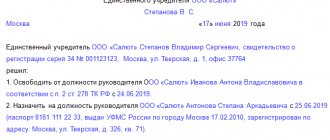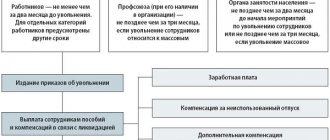Where does the procedure begin?
The procedure for terminating commercial activities is established by Art. Art. – Law 14-FZ dated 02/08/98 and Art. Art. - Civil Code of the Russian Federation. At the general meeting, the owners form a collegial body responsible for closing the company and appoint its chairman. Often, the procedure is entrusted to just one specialist – the liquidator. The legislator does not limit the founders' choice. The functions may be assigned to an independent manager, one of the company’s owners or a full-time employee. The conditions for granting powers are:
- full legal capacity;
- absence of existing restrictions in the management of a legal entity (disqualification);
- consent to perform duties.
If the business is winding down voluntarily, the director can handle the registration. The top manager is well acquainted with the intricacies of the organizational structure, communicates with counterparties, and remains aware of all matters. At the time the decision is made, he is removed from office and given the status of liquidator. Sometimes a manager combines the post of head of a company with new responsibilities.
Important! Information about the closure of an enterprise is included in the Unified State Register of Legal Entities within 3 days. The deadline starts from the day the founders make the decision. For this purpose, the liquidator sends application P15001 to the tax authorities. One copy of the decision or minutes of the meeting of owners is attached to the form (Article 20 of Law 129-FZ dated 08.08.01).
A different scenario occurs if the company is forced to close. In this case, the decision is made by the court, and the duties of the liquidator are assigned to an independent specialist. The director is deprived of the opportunity to influence the outcome of the case. Thus, the removal of a manager from office follows the introduction of external or bankruptcy management procedures in relation to a bankrupt organization. At the observation stage, deprivation of powers can be carried out in case of obvious abuses.
Dismissal upon liquidation of an organization: we notify the trade union committee
The primary trade union organization should be notified of future dismissal. This must be done 3 months remaining until the termination of the employment relationship (clause 2 of article 12 of the Federal Law “On trade unions, their rights and guarantees of activity” dated January 12, 1996 No. 10-FZ).
It is allowed to compose a notification in any form. The document should contain a list of employees subject to dismissal, as well as indicate the number of the liquidation decision and the date of the protocol.
Often, to sign a collective agreement, workers create a labor council. This association is not a trade union organization, and the law does not oblige it to notify.
Grounds for removal from office
The dismissal of the director, as well as other personnel, is included in the list of standard measures for closing a company. There is no need to look for additional reasons. However, the situation may develop according to an alternative scenario. When resolving the issue of the liquidation commission, one should be guided by the provisions of chapters and the Labor Code of the Russian Federation.
| Grounds for dismissal of a director | Legal characteristics |
| Voluntary resignation | The head of the company submits a letter of resignation 1 month in advance. The corresponding rule is enshrined in Article 280 of the Labor Code of the Russian Federation. Courts also apply general norms to relationships. It is allowed to dismiss a manager at his own request even before the end of the specified period. The work book makes reference to Article 80 of the Code |
| Termination of an employment contract due to its expiration | Conclude agreements with top managers Art. Art. and 275 of the Labor Code of the Russian Federation are allowed for a certain period. The maximum must be stated in the company's charter (up to 5 years). If by the time of liquidation the time for exercising powers expires, Article 79 of the Code is recognized as the basis for dismissal. In this case, the manager must be notified 3 days in advance. |
| Agreement of the parties | The contract is terminated based on the results of negotiations. The director receives a payment in the form of a so-called golden parachute. This method avoids conflicts. When dismissing, refer to Article 78 of the Labor Code of the Russian Federation |
| Initiative of society participants (on special grounds) | The hard option for removing a top manager is based on clauses 9 and 10 of Art. 81 Labor Code of the Russian Federation. The norms are referred to in the event of damage to society due to unlawful actions or incompetence of a manager. The decision on removal is made by the founders at the general meeting. Dismissal acts as a disciplinary punishment and is often accompanied by litigation |
| Change of owners of the organization's property | Buying a business gives the new owner the right to appoint his own top manager. In this situation, the displacement of the head becomes inevitable. The dismissal record contains a reference to the fourth part of paragraph 1 of Article 81 of the Labor Code of the Russian Federation |
| Additional grounds provided for in the employment contract | The contract with the manager allows you to stipulate special reasons for resigning. The law does not provide an exhaustive list. Traditionally, these are unsatisfactory economic results and refusal to implement the decisions of the founders. If these circumstances occur, there is no need to prove damage to the company. Dismissal is carried out under Article 81 of the Labor Code of the Russian Federation |
If none of the above grounds are suitable, the contract is terminated at the initiative of the participants. Labor relations with the organization are terminated without specifying a reason. This right follows from the meaning of Article 287 of the Labor Code of the Russian Federation and was confirmed by the Supreme Court of the Russian Federation in Resolution No. 21 of 06/02/15.
Regulations
Issues of dismissal of company personnel during its liquidation are regulated by regulatory documents, the main of which include:
- Labor Code of the Russian Federation No. 197-FZ, chapter 13 (clause 1, part 1, article 81), chapter 27 (parts 1 and 2, article 178, parts 2 and 3, article 180)
- Federal Law No. 79-FZ of July 27, 2004 (in case of abolishment of a government agency).
The Labor Code of the Russian Federation does not directly refer to the interpretation of the concept of liquidation of a subject of law, therefore, for the correct application of legal norms in the process of dismissal of an organization’s personnel, it is necessary to also refer to the Civil Code of the Russian Federation, without replacing issues related to the liquidation of an organization with measures for its reorganization or a change in the owner of property.
Attention
A feature of the liquidation procedure is the complete termination of all obligations and rights of a legal entity, without the possibility of transferring them to other business entities.
The primary grounds for starting the liquidation procedure are Article 61 of the Civil Code of the Russian Federation:
- decision of the founders or an authorized higher organization authorized to make such a decision;
- court decisions on claims by state or local authorities;
- decision of the founder of a subject of economic law when predicting a lack of potential to achieve the planned goal, the impossibility of continuing the company’s activities, or the emergence of serious difficulties in carrying out such activities.
Information
The termination of the functioning of an organization can also be determined by the expiration of the intended period of its activity or the achievement of the results that were the purpose of its creation.
Registration procedure
The dismissal of the director during the official liquidation of the organization is accompanied by the preparation of personnel documents. Payment of compensation depends on the reasons for removal from office. If the order contains a reference to part 1 of paragraph 1 of Article 81 of the Labor Code of the Russian Federation, the procedure will include the following steps:
- Notification. The director is recognized as an employee, and therefore the notice must be given 2 months in advance against signature (Article 178 of the Labor Code of the Russian Federation). The period may be reduced subject to payment of compensation for earnings. The amount is determined in proportion to the time not worked.
- Making a decision and issuing an order. The expression of will of the founders of the company is sufficient to terminate the contract with the top manager. Form T-8 is not a mandatory document. This opinion is shared by Rostrud in letter No. 1143-TZ dated March 11, 2009. However, lawyers recommend drawing up a personnel order, referring to Article 84.1 of the Labor Code of the Russian Federation. In any case, filling out a standard form in addition to the owners’ decision will not constitute a violation.
- Issuance of a work book. A record of dismissal is made in the general manner, indicating a specific article of the Labor Code of the Russian Federation. The basis should be the decision of the sole owner or the minutes of the general meeting of founders. The corresponding explanations were given by representatives of Rostrud in letter No. 1143-TZ.
The director is obliged to transfer the entrusted valuables and documents to the liquidator before the official resignation. The algorithm of actions is determined by internal regulations, the scope of reports and other aspects. The manager bears full financial responsibility for the condition of the property (Article 277 of the Labor Code of the Russian Federation). This means that the procedure must be preceded by an inventory.
Important! If we are talking about closing a business, there is no need to additionally disclose information about the removal of a top manager. All information is reflected in the Unified State Register of Legal Entities after filing application R15001 and publishing messages in the State Registration Bulletin.
The moment of dismissal of a director largely depends on the decision of the liquidators. The commission must take into account the position of the founders, which is directly related to the reasons for winding down the business.
| Options for the development of events | Contract termination date |
| The director is employed and does not participate in the closure of the company | A top manager must be dismissed after 2 months after delivery of the notice or earlier with payment of appropriate compensation (178 Labor Code of the Russian Federation) |
| The manager is a member of the liquidation commission or is its chairman | The head may resign at the time of formation of the collegial body or on the day the company is excluded from the Unified State Register of Legal Entities |
| The head is directly related to the collapse of the business and is not allowed to close it | The contract is terminated without payment of benefits. Damages are recovered from the unscrupulous top manager in court |
| The director is the owner of the company | The legislation of the Russian Federation provides the founder with the opportunity to draw up all the necessary documents himself. A participant has the right to assign the powers of a director to himself, receiving remuneration for this. In the event of liquidation, he may qualify for severance pay. If there are not enough funds for payments, you are allowed to resign on your own initiative |
Employment service notification
Law of the Russian Federation No. 1032-1 of April 19, 2001 obliges the employer of a liquidated company to inform the labor exchange in writing about the release of employees within the following periods:
- director of the organization - 2 months;
- employer - individual entrepreneur - 2 weeks in advance.
This notice must contain the information necessary for further employment of workers:
- Job title.
- Profession, specialty.
- Qualification requirements for relevant positions.
- Salary information (individually for each employee).
Attention
If liquidation measures involve the dismissal of personnel in large numbers, then employment services are informed 3 months in advance.
Regional authorities, based on the territorial and city-forming characteristics of the corresponding subject of the Federation, the state of the labor market in the region, are authorized to determine their criteria for assessing the massive release of labor resources, aimed at additional social protection of the population.
Financial aspect
Compensation payments are directly related to the procedure for terminating the employment contract. When closing a company, the head of the company has equal rights with ordinary employees. The final payment will include:
- Wages. The calculation procedure does not change. For unused vacation, compensation is given according to the rules of Art. 127 Labor Code of the Russian Federation.
- Benefits. The average monthly salary is transferred to the dismissed manager no later than the last day of work. If the ex-manager cannot find a new position, compensation in the same amount is assigned for another 2 months. For the third month, the content is transferred according to the decision of the territorial employment department. The director acquires the right to such payment upon registration with unemployment. You must register within 2 weeks after dismissal (Article 178 of the Labor Code of the Russian Federation).
The removal of the head of the company from his post by agreement of the parties requires a different settlement procedure. The size of the “golden parachute” is determined by the founders in agreement with the top manager. The legislator does not establish restrictions. If the basis is the director’s guilty actions, severance pay and compensation are not accrued.
Dismissal on the initiative of the founders without specifying reasons deserves special attention. In this case, Articles 278 and 279 of the Labor Code of the Russian Federation are subject to application. In addition to salary, the top manager receives compensation in the amount of three salaries.
Consequences of errors
Violations of the law when removing a manager from office can lead to lengthy legal proceedings. Disputes with such an employee are classified as cases of general jurisdiction. During the hearings, the plaintiff is obliged to prove the fact of violation of labor rights, and the defendant is obliged to justify the decisions made. If the court sides with the ex-director, the company will have to compensate for the damage caused.
Errors in calculating benefits or failure to comply with notification deadlines also entail administrative sanctions. The labor inspectorate, prosecutor's office or court have the right to impose a fine on the company. Punishment follows Article 5.27 of the Code of Administrative Offenses of the Russian Federation. The chairman and members of the liquidation commission face monetary penalties (in rubles):
- general violations of labor legislation – 1–20 thousand;
- non-compliance with the payment procedure – 10 thousand –20 thousand.
The company is also subject to fines. For similar offenses, organizations are withheld up to 70 thousand and 100 thousand rubles, respectively. Officials are additionally subject to disqualification for up to 3 years.
Results
The dismissal of the head of an enterprise is carried out according to standard rules. The classic procedure involves the founders making a decision,
drawing up personnel orders, making entries in the work book and paying compensation. The specific features of the process are given by the special status of the employee. First, the commission will have to conduct an inspection of the entrusted property and evaluate the true reasons for the resignation. Calculations will also depend on the grounds for removal from office. The company has the right to refuse to accrue severance pay if the director voluntarily refuses to continue working in the position. This opportunity also arises when the employment contract is terminated due to the fault of the top manager or the expiration of the employment period.
Nuances
In some cases, the position of the director, including in the event of bankruptcy, may be retained until the organization is completely removed from the register. This is also possible if there is a bankruptcy trustee. But even under this condition, the cases will still have to be transferred to him.
Among the important points there are a number of nuances:
- after dismissal, all funds required by labor law are paid. Mandatory payments also include additional amounts specified in the contract or employment agreement. Before the dismissal, an additional agreement may be concluded. All points are mandatory, regardless of the liquidation process;
- The dismissal order on the basis of Article 81 must also include details of the decision of the court or the advisory body of the organization. This will be the justification for dismissal;
- all documents are fully prepared. Each stage has its own document that will have to be submitted to the regulatory authority to confirm liquidation;
- all supervisory authorities must be notified of the procedure before layoffs begin. Also, the notification is sent in the standard mode to the trade union and the labor exchange.
You need to remember that if a director leaves his post to become a liquidator, then he must first leave his previous position in the standard version. After this, a new contract or agreement is concluded.
The CEO is considered the head of the organization. When it is liquidated, he resigns along with the rest of the employees. Liquidation may be regulated by a decision of the management body or founder or by a court order. Each option has its own characteristics that must be taken into account in order to fulfill all the conditions.









